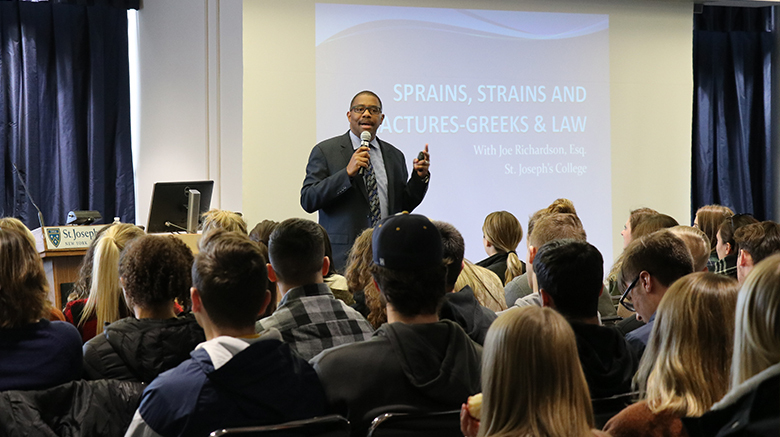Lead by example.
That was the message delivered by attorney Joseph Richardson during an anti-hazing assembly Wednesday at SJC Long Island.
“You have a duty to graduate, to do well here,” he told an audience filled with SJC Long Island athletes and sorority and fraternity members. “You have young ‘brothers and sisters,’ people who look up to you. You’ve got a duty to make their lives better.”
Attendance at the event, which took place in the McGann Conference Center during common hour and again from 5–6 p.m., was required of all members of SJC Long Island’s Greek life organizations.
Richardson is an accomplished attorney and speaker, regularly contributing his legal insight and commentary to the media. He speaks regularly on college campuses, encouraging students to embrace their legal and ethical duties.
“Stay focused on the notion that this (mission of the College) is what you’re here for. And that it would be a terrible thing if, aside from the law, you are to do something that would undermine your ability to take advantage of the mission of the College.”
Three Key Areas of Richardson’s Presentation:
Laying Down the Law: In February of 2017, New York passed an amendment to penal law sections 120.6 and 120.7 in chapter 716, which defines what makes a person guilty of hazing in the first and second degree. This amendment was due to the 2013 hazing-related death of 20-year-old Michael Deng, a student at Baruch College. The amended law prohibits physical contact or activity in any organization’s initiating ceremony that creates substantial risk of injury.
Dangers of Groupthink Mentality: “There’s a safety in numbers, but the danger is we use that safety sometimes to do things we wouldn’t otherwise do,” Richardson said.
Many instances of hazing a result of groupthink mentality, he explained.
Staying Legal and Better: Even if something isn’t necessarily against the law, it might be against the College’s Code of Conduct, and it could result in suspension or expulsion.
“It doesn’t take much to haze under the law,” Richardson said. “And it doesn’t take much to haze under your own codes of conduct. I’m not just talking about you going to jail and getting in legal trouble, I’m talking about you getting in moral or ethical trouble.
“Don’t just think about what is legal,” he continued. “Think about what is right.”
St. Joseph’s College’s Policies on Hazing*
Minimum sanction: Suspension; Maximum sanction: Expulsion.
A student will be found responsible for hazing if, in connection with the initiation of applicants to or members of a student organization (including but not limited to fraternities and sororities, athletic teams, SGA organizations, honor societies, etc.) he or she organizes, promotes, facilitates or engages in any conduct, other than competitive athletic events, which a) places or may place another person in danger or bodily injury or b)demonstrates indifference or disregard for another person’s rights, dignity or well-being. Examples of hazing include, but are not limited to the following:
1. Forced or required ingestion of alcohol, drugs, food or any undesirable substance or quantity of substances.
2. Participation in sexual rituals or assaults.
3. Forced or required participation in criminal conduct, conduct which violates the civil rights of others.
4. Conduct which is mentally abusive or degrading to the participants or others.
5. Acts that could result in physical, mental or emotional deprivations or harm.
6. Physical abuse, including whipping, paddling, beating, tattooing, branding, exposure to the elements. Organizations charged with hazing, as distinct from individuals charged, face College disciplinary action.

